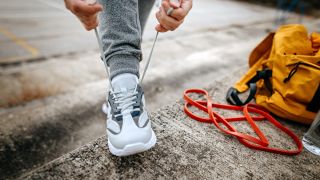The Best Portable Gym Equipment
Fill your bag with this lightweight kit so you can work out on the move

One of the most common reasons people give for not exercising is that they don’t have the time. Or, more specifically, they don’t have time to visit a gym. But while the gym is full of useful gear, you don’t need it to get a good training session in. The best home gym equipment can turn your house into the perfect place to train, and if you invest in a few portable bits of kit you can carry them with you so you can keep fit wherever you end up – especially useful if you travel frequently for work.
Below you’ll find our guide to the best portable gym equipment.
Resistance Bands
What are they good for? One of the most versatile bits of kit you can get, resistance bands can be used to intensify any kind of workout, or to help you warm up before a session with heavier weights, or to rehab after injury by doing physiotherapy exercises. They can even make some moves easier, such as pull-ups.
What types are there? You can get looped or straight resistance bands, with the looped kind coming in small or large sizes. Smaller loops are good for putting around your legs for exercises like banded squats, while larger ones are handy for assisted pull-ups. Straight bands are useful for mobility work and stretching, and can be tied off to create a loop. There are also straight bands with handles which are great for moves like biceps curls.
How much space do they take up? With smaller, lighter looped resistance bands it’s easy to slip a set of five into a pocket of your bag. The heavier the band the larger it is and the less portable it becomes, though it will also provide more resistance during exercises. If you have a set of tubular bands with handles then they will take up a bit more space, but they do usually come with their own bag.
How much do they cost? Resistance bands offer great bang for your buck – full sets of five bands often cost less than £20. The heavier the band you’re after, the more expensive it will be; the colour of the band usually indicates the weight.
Browse our selection of the best resistance bands.
Get the Coach Newsletter
Sign up for workout ideas, training advice, reviews of the latest gear and more.
Abs Rollers
What are they good for? Performing the abs roll-out, which is one of the best core exercises you can do.
What types are there? There’s not much variation to report here. An abs roller is a wheel with handles either side, which is all you need to perform the exercise. There are some rollers with longer handles or two wheels, but they are all primarily designed for the same purpose – performing roll-outs.
How much space do they take up? Rollers are not quite as backpack-friendly as resistance bands: they usually measure around 30-35cm across, though some have removable handles to make them easier to pack.
How much do they cost? You can get a cheap roller for less than £10, and even if you want something more heavy-duty or with added frills like a removable handle, you usually won’t spend more than £40.
See what’s available with our picks of the best abs rollers.
Suspension Trainers
What are they good for? Creating instability. Not in your life, but in your workouts. You can use suspension trainers for variations on pretty much any traditional strength exercise, and they will add instability to increase the benefits to your core strength.
What types are there? Suspension trainer kits include a couple of long ropes with handles that you place your hands or feet into during exercises, as well as mounts you can attach to a door or another sturdy surface like a tree branch.
How much space do they take up? Suspension trainers usually come with a handy bag, and once packed they don’t take up much space at all – especially since you can stuff them into tight pockets because there are very few hard pieces on them. They’re also very light.
How much do they cost? TRX is the big name in suspension training and its kits cost £80-£200, but there are many other brands who make excellent trainers for less. The cheapest option in our round-up is just £15.
Survey the options with our round-up of the best suspension trainers.

Nick Harris-Fry is a journalist who has been covering health and fitness since 2015. Nick is an avid runner, covering 70-110km a week, which gives him ample opportunity to test a wide range of running shoes and running gear. He is also the chief tester for fitness trackers and running watches, treadmills and exercise bikes, and workout headphones.
